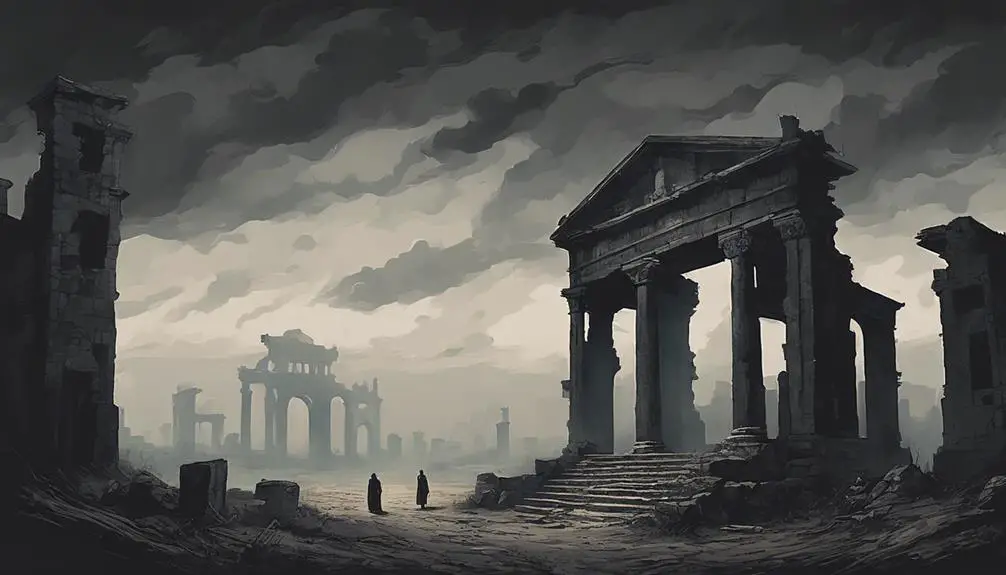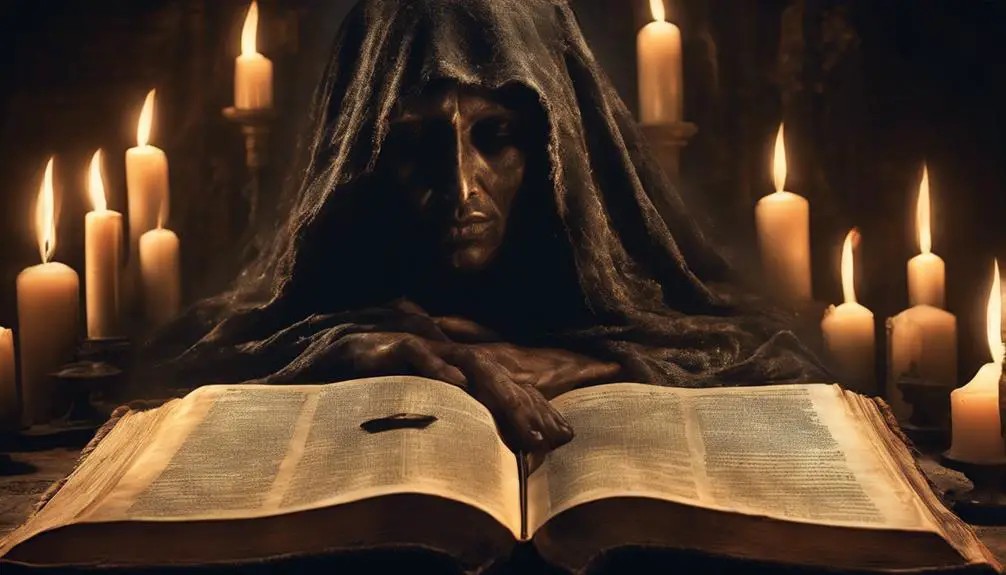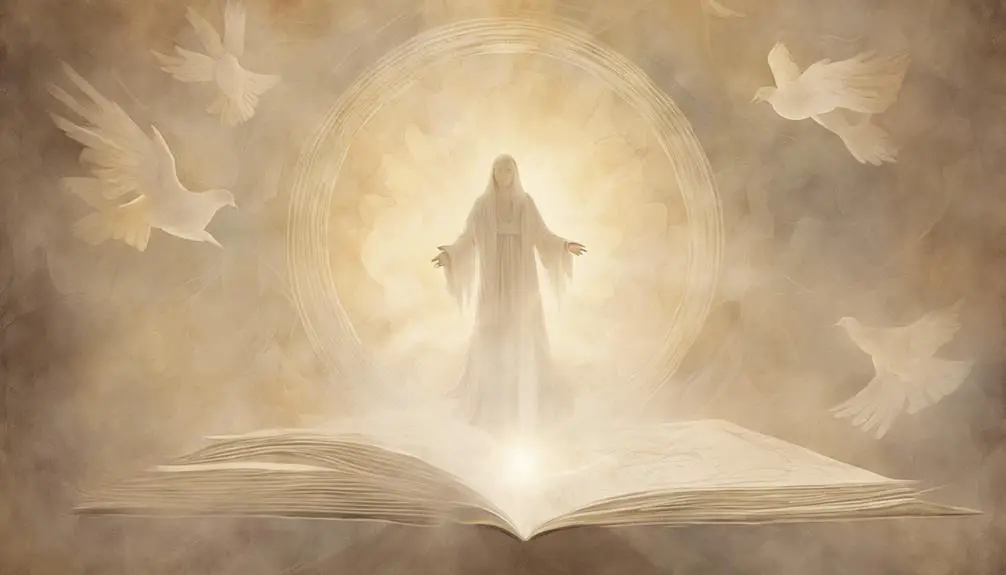Mysterious and malevolent, unclean spirits in the Bible weave a complex narrative of intrigue and spiritual warfare, beckoning deeper exploration.

What Are Unclean Spirits in the Bible
Imagine wandering through an ancient, dimly lit village where whispers of unseen forces stir the air around you. You've likely heard of unclean spirits, entities mentioned throughout the Bible that evoke both curiosity and unease.
These spirits, often deemed malevolent, play a significant role in biblical narratives, yet their origins, characteristics, and the nature of their interactions with humanity are shrouded in mystery.
As you explore the theological interpretations and biblical references, you'll uncover layers of meaning that have puzzled scholars and believers alike for centuries.
Let's embark on a journey to better understand these enigmatic beings and their impact on biblical stories and beliefs.
Key Takeaways
- Unclean spirits in the Bible symbolize moral and spiritual corruptions, transcending Judeo-Christian tradition.
- They are depicted as influencing both physical and spiritual realms, often causing personality changes.
- Biblical narratives on unclean spirits encourage deeper engagement with texts, reflecting cultural perceptions of spiritual adversity.
- Exorcisms and encounters with unclean spirits highlight the ongoing battle between good and evil in spiritual contexts.
Definition and Origins

In exploring the definition and origins of unclean spirits as described in the Bible, we delve into a complex interplay of theology, history, and spirituality. You'll find that the concept of unclean spirits isn't solely confined to the Judeo-Christian tradition but spans across various cultures, enriched by a comparative mythology framework. This cross-cultural viewpoint allows you to appreciate the depth of understanding and the nuanced interpretations that have evolved over time.
The cultural context in which these scriptures were written plays a crucial role in deciphering the nuanced meanings behind unclean spirits. Ancient societies often grappled with existential questions and sought explanations for the moral and physical dilemmas they faced. Thus, unclean spirits weren't merely malevolent entities but symbolized deeper moral and spiritual corruptions that afflicted individuals and communities.
Comparative mythology further illuminates this discourse by highlighting similarities and differences among world cultures in their conceptualization of evil spirits. By examining these parallel narratives, you gain a more holistic view of how unclean spirits have been understood as manifestations of universal human concerns—purity, morality, and the struggle between good and evil. This scholarly journey not only broadens your perspective but deepens your reverence for the intricate tapestry of beliefs that have sought to make sense of the unseen.
Biblical References
The Bible teems with references to unclean spirits, offering a rich tapestry for understanding their role in spiritual warfare and moral teaching. As you delve into these sacred texts, you'll notice language variations that reflect the diverse cultural perceptions of the time. These variations aren't merely linguistic nuances; they're windows into how different communities understood and interacted with the spiritual realm.
For instance, the term 'unclean spirit' itself, while consistently used across various books, carries implications that vary from one biblical account to another. This diversity underscores the adaptability of unclean spirits within the biblical narrative, serving as a bridge between the spiritual teachings of the Bible and the lived experiences of its diverse audience.
Moreover, the contexts in which these spirits are mentioned—ranging from personal possession to widespread societal influence—highlight the multifaceted nature of spiritual adversity faced by believers. This layered depiction invites you to appreciate the complexity of moral and spiritual challenges, encouraging a deeper engagement with the text.
In essence, the biblical references to unclean spirits aren't just historical or theological artifacts. They're part of an ongoing conversation about faith, purity, and the nature of evil, enriched by the cultural perceptions and language variations of ancient times.
Characteristics and Powers

Delving into the characteristics and powers of unclean spirits, you'll uncover a realm where these entities wield influence over both the physical and spiritual dimensions, revealing their complex nature within biblical narratives. These spirits aren't mere myths; they're deeply entrenched in the fabric of spiritual warfare, possessing abilities that cause both fascination and fear among believers.
To draw you deeper into understanding, consider these key points:
- Spiritual Manifestations: Unclean spirits often reveal themselves through supernatural phenomena. They don't conform to our physical laws, making their presence known through chilling spiritual manifestations that defy explanation.
- Possession Symptoms: Individuals afflicted by these spirits exhibit symptoms that are both physical and psychological. These may include sudden changes in personality, unexplained illnesses, or abilities that the person didn't possess before, pointing towards the invasive influence of an unclean spirit.
- Influence Over Environment: Beyond affecting individuals, unclean spirits can cast a shadow over places, creating atmospheres filled with oppression and darkness. This ability to alter the spiritual climate of an area highlights their desire to spread discord and unrest.
In studying these characteristics and powers, you're engaging with a spiritual realm that demands both respect and caution, as these entities play pivotal roles in the ongoing battle between good and evil.
Encounters and Exorcisms
Throughout history, countless individuals have faced encounters with unclean spirits, leading to the complex and sacred practice of exorcisms. These rituals, deeply rooted in religious traditions, serve as a bridge between the physical and spiritual realms, offering solace and liberation to those afflicted. You'll find that exorcisms aren't mere relics of the past; modern parallels exist, reflecting the enduring belief in the power of faith to overcome malevolent forces.
Analyzing these practices reveals fascinating cultural variations. In some traditions, exorcisms are quiet, meditative processes, while in others, they're public, fervent ceremonies. Regardless of the method, the aim remains the same: to cleanse the individual of the unclean spirit. This diversity underscores the universal recognition of the spiritual battle between good and evil, transcending cultural boundaries.
As you delve deeper into the subject, you'll appreciate the nuanced understanding that different faiths bring to the concept of unclean spirits and the rituals designed to combat them. The reverence with which these exorcisms are approached highlights their significance not only in religious texts but in the lives of believers around the world.
Theological Interpretations

In exploring the theological interpretations of unclean spirits, you'll uncover a rich tapestry of beliefs that illuminate how various religions perceive and confront these malevolent entities. These interpretations, deeply rooted in historical context, offer insights into the cultural impact of unclean spirits across different eras and societies. By delving into the theological frameworks, you gain a profound understanding of the spiritual battles depicted in sacred texts, and how these narratives have shaped the moral and ethical guidelines of communities throughout history.
To keep you engaged and enhance your understanding, consider these aspects:
- The role of unclean spirits in illustrating the struggle between good and evil, and its implications for personal virtue and societal laws.
- The evolution of exorcism rituals within various religious traditions, reflecting changes in theological interpretations and cultural attitudes towards unclean spirits.
- The impact of historical events on the perception of unclean spirits, highlighting how societal fears and challenges are mirrored in theological narratives.
Through this scholarly and reverent exploration, you're invited to reflect on the complex interplay between faith, culture, and the unseen forces that have intrigued and challenged humanity throughout the ages.
Frequently Asked Questions
How Have Perceptions of Unclean Spirits Evolved in Different Cultures Throughout History Outside of the Biblical Context?
You've seen how cultural superstitions and artistic interpretations shape our understanding of unclean spirits. Across history, every culture has reimagined these entities, moving from fear to fascination.
Artists and storytellers have often played a key role, transforming ancient fears into symbols of deeper psychological or societal struggles. This evolution reflects a broader shift in how we grapple with the unknown, showing reverence for the power of belief to shape our collective imagination.
What Are the Psychological Interpretations of Encounters With Unclean Spirits as Described in the Bible?
In exploring psychological interpretations of encounters with unclean spirits, you're delving into how these narratives might symbolize mental health struggles. Scholars suggest these stories can represent internal battles, fears, or societal pressures.
This symbolic interpretation invites a deeper understanding of human psychology, framing these encounters as metaphors for personal or communal challenges. It's a reverent, analytical approach that respects the biblical text while exploring its relevance to contemporary issues of mental health.
How Do Modern Religious Denominations Differ in Their Beliefs and Practices Regarding Unclean Spirits?
Navigating the sea of beliefs about unclean spirits, you'll find that modern religious denominations diverge significantly. Some view exorcism rituals and spiritual warfare as fundamental defenses against these malevolent entities, anchoring their practices in ancient traditions.
Others adopt a more symbolic stance, seeing these concepts as metaphors for internal struggles. This spectrum reflects a rich tapestry of interpretation, each strand woven with reverence and scholarly analysis, highlighting the diverse responses to spiritual adversities.
Are There Any Documented Cases or Studies in Contemporary Times That Claim to Provide Evidence of Unclean Spirits' Existence?
You're exploring whether contemporary times have documented cases or studies claiming evidence of unclean spirits.
Yes, various exorcism rituals and paranormal investigations have been documented, aiming to provide such evidence.
While the methodologies and interpretations of findings vary, these efforts reflect a continued interest in understanding phenomena often described as unclean spirits.
Scholars and practitioners analyze these cases with a mix of skepticism and reverence, contributing to ongoing debates on spiritual encounters.
How Do Unclean Spirits in the Bible Compare With Similar Entities in Other Religious Texts and Mythologies Around the World?
Diving into the world of spirits, you'll find the Bible's unclean spirits rubbing shoulders with their counterparts from various cultures. This demonology comparison reveals fascinating mythological parallels. It's like realizing all ancient texts had a group chat about the supernatural.
Analyzing these entities side by side, you'll uncover a rich tapestry of belief systems, each offering a unique lens on the unseen forces at play in the human experience.
Conclusion
In conclusion, unclean spirits in the Bible represent malevolent entities opposing divine will, with their origins rooted in rebellion against God. Through biblical narratives, such as the account of Jesus casting out demons in Mark 5, we witness the profound impact these spirits have on individuals and communities.
Theologically, these encounters emphasize the ongoing spiritual battle and the power of faith and divine authority. Understanding the nature and influence of unclean spirits invites a deeper reflection on the spiritual dimensions of our existence.



Sign up